German actress Karin Hardt (1910-1992) made her cinema debut as a pure and disarmingly natural backfisch, looking for happiness. Her impressive career with many film, theatre and television appearances lasted for six decades.
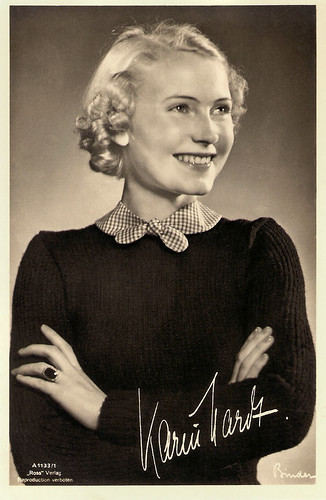
German postcard by Ross Verlag, no. A 1133/1, 1937-1938. Photo: Alex Binder.
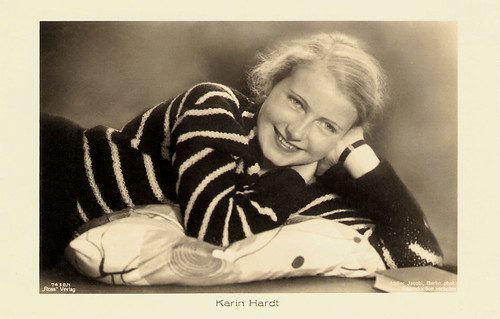
German postcard by Ross Verlag, no. 7438/1, 1932-1933. Photo: Atelier Jacobi, Berlin.
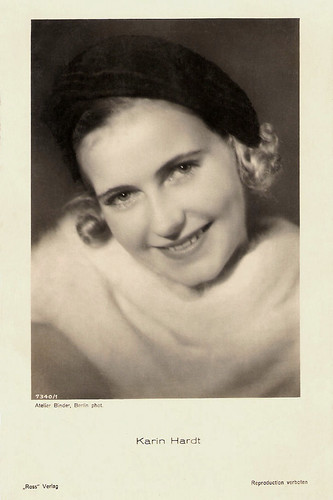
German postcard by Ross Verlag, no. 7340/1, 1932-1933. Photo: Atelier Binder, Berlin.
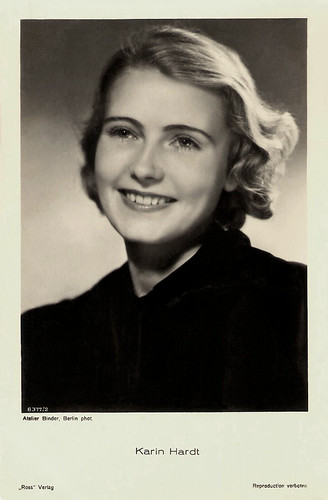
German postcard by Ross Verlag, no. 8377/2, 1934-1935. Photo: Atelier Binder, Berlin.
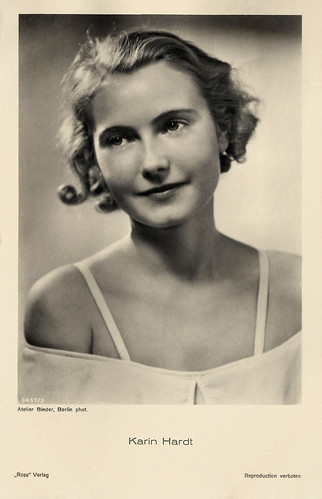
German postcard by Ross Verlag, no. 9457/2, 1935-1936. Photo: Atelier Binder, Berlin.
Karin Therese Meta Hardt was born in Altona (now Hamburg), Germany in 1910. She was the daughter of a merchant.
She had private acting lessons with Alex Otto and soon had theatre engagements in Mönchengladbach, Rheydt and Altenburg.
In 1931 she made her film debut in Vater geht auf Reisen/Father Goes To Travel (Carl Boese, 1931) with Lissi Arna.
She was then discovered by director Erich Waschneck, who cast her in Acht Mädels im Boot/Eight Girls in a Boat (Erich Waschneck, 1932), which became her breakthrough.
She was the pure and disarmingly natural backfisch, who in a girly way angled for happiness.
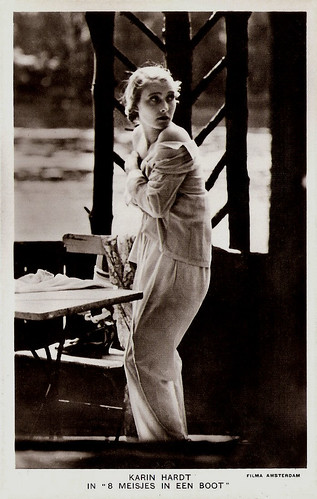
Dutch postcard by M. Bonnist & Zonen, Amsterdam, no. 146. Photo: Filma, Amsterdam. Still from Acht Mädels im Boot/Eight Girls in a Boat (1932).
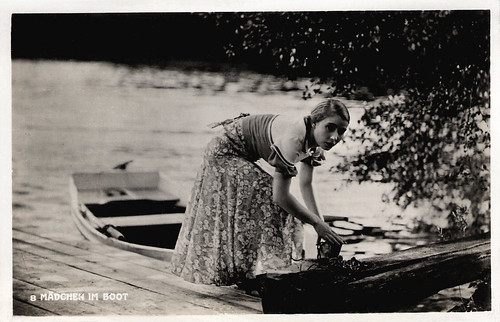
Dutch postcard by JosPe, Arnhem. Publicity still for Acht Mädels im Boot/Eight Girls in a Boat (Erich Waschneck, 1932).
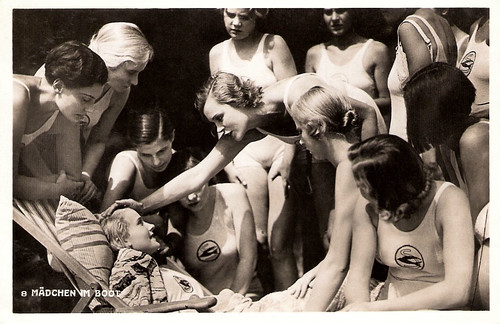
Dutch postcard by JosPe. Photo: still from Acht Mädels im Boot/Eight Girls in a Boat (1932).
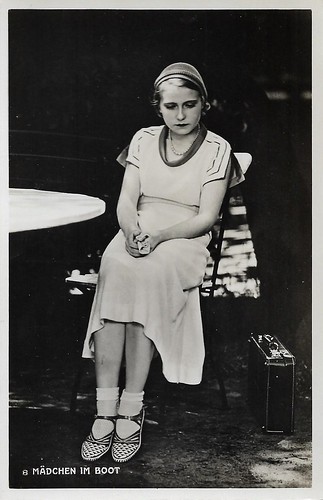
Dutch postcard (with Dutch censorship mark on the right) by JosPe, Arnhem. Karin Hardt (Christa) in Acht Mädels im Boot/Eight Girls in a Boat (Erich Waschneck, 1932), presented here as 8 Mädchen im Boot. The Dutch title was 8 Meisjes in een boot.
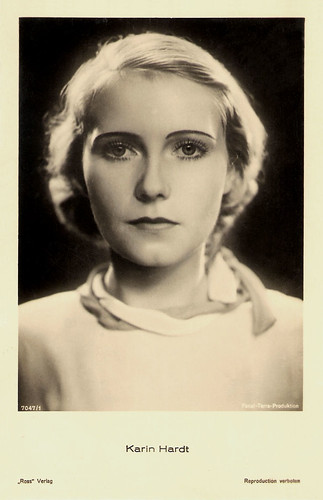
German postcard by Ross Verlag, no. 7047/1, 1932-1933. Photo: Fanal / Terra Produktion. Publicity still for Acht Mädels im Boot/Eight Girls in a Boat (Erich Waschneck, 1932).
In the following years, Karin Hardt became a beloved star.
Karin Hardt and Erich Waschneck married in 1933, and he would go on to direct her in some of their best films, including An heiligen Wassern/Sacred Waters (1932) and Abel mit der Mundharmonika/Abel with the Mouth Organ (1933).
Among her best-known films in the following years belong Ein gewisser Herr Gran/A Certain Mr. Gran (Gerhard Lamprecht, 1933) next to Hans Albers, Die blonde Christel/Blonde Christel (Frans Seitz, 1933), and Barcarole
(Gerhard Lamprecht, 1935).
German postcard by Ross Verlag, no. A 1133/1, 1937-1938. Photo: Alex Binder.

German postcard by Ross Verlag, no. 7438/1, 1932-1933. Photo: Atelier Jacobi, Berlin.

German postcard by Ross Verlag, no. 7340/1, 1932-1933. Photo: Atelier Binder, Berlin.

German postcard by Ross Verlag, no. 8377/2, 1934-1935. Photo: Atelier Binder, Berlin.

German postcard by Ross Verlag, no. 9457/2, 1935-1936. Photo: Atelier Binder, Berlin.
Disarmingly natural
Karin Therese Meta Hardt was born in Altona (now Hamburg), Germany in 1910. She was the daughter of a merchant.
She had private acting lessons with Alex Otto and soon had theatre engagements in Mönchengladbach, Rheydt and Altenburg.
In 1931 she made her film debut in Vater geht auf Reisen/Father Goes To Travel (Carl Boese, 1931) with Lissi Arna.
She was then discovered by director Erich Waschneck, who cast her in Acht Mädels im Boot/Eight Girls in a Boat (Erich Waschneck, 1932), which became her breakthrough.
She was the pure and disarmingly natural backfisch, who in a girly way angled for happiness.

Dutch postcard by M. Bonnist & Zonen, Amsterdam, no. 146. Photo: Filma, Amsterdam. Still from Acht Mädels im Boot/Eight Girls in a Boat (1932).

Dutch postcard by JosPe, Arnhem. Publicity still for Acht Mädels im Boot/Eight Girls in a Boat (Erich Waschneck, 1932).

Dutch postcard by JosPe. Photo: still from Acht Mädels im Boot/Eight Girls in a Boat (1932).

Dutch postcard (with Dutch censorship mark on the right) by JosPe, Arnhem. Karin Hardt (Christa) in Acht Mädels im Boot/Eight Girls in a Boat (Erich Waschneck, 1932), presented here as 8 Mädchen im Boot. The Dutch title was 8 Meisjes in een boot.

German postcard by Ross Verlag, no. 7047/1, 1932-1933. Photo: Fanal / Terra Produktion. Publicity still for Acht Mädels im Boot/Eight Girls in a Boat (Erich Waschneck, 1932).
Naive, blonde competitor
In the following years, Karin Hardt became a beloved star.
Karin Hardt and Erich Waschneck married in 1933, and he would go on to direct her in some of their best films, including An heiligen Wassern/Sacred Waters (1932) and Abel mit der Mundharmonika/Abel with the Mouth Organ (1933).
Among her best-known films in the following years belong Ein gewisser Herr Gran/A Certain Mr. Gran (Gerhard Lamprecht, 1933) next to Hans Albers, Die blonde Christel/Blonde Christel (Frans Seitz, 1933), and Barcarole
In the second half of the 1930s followed Die Umwege des schönen Karl/The Diversions of Handsome Karl (Carl Froelich, 1938) with Heinz Rühmann, and Menschen vom Variete/Vaudeville People (Josef von Báky, 1939) as the naive, blonde competitor of La Jana.
During the war years, her engagements became less, but Karin Hardt appeared for example in films like Kameraden/Comrades (Hans Schweikart, 1941) with Willy Birgel, Das Hochzeitshotel/The Marriage Hotel (Carl Boese, 1944), and Via Mala (Josef von Báky, 1944-1948) as the daughter of Carl Wery.
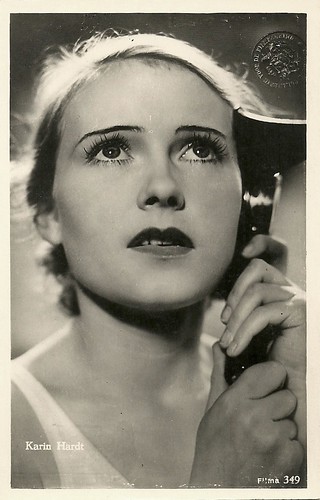
Dutch postcard by JosPe, Arnhem, no. 349. Photo: Filma. Dutch censorship mark at the right. Publicity still for Acht Mädels im Boot/Eight Girls in a Boat (Erich Waschneck, 1932).

Dutch postcard (with Dutch censorship mark on the right) by JosPe, Arnhem. Photo: Theodor Loos (Baumeister Engelhardt) and Karin Hardt (Christa) in Acht Mädels im Boot/Eight Girls in a Boat (Erich Waschneck 1932), presented here as 8 Mädchen im Boot. The film was remade in the Netherlands in 1958 as Jenny (Willy van Hemert, 1958).

German postcard by Ross Verlag, no. 171/1. Photo: Fanal-Terra-Produktion. Karin Hardt in An heiligen Wassern (Erich Waschneck, 1932).

German postcard by Ross Verlag, no. 188/1. Photo: Ufa. Hans Albers and Karin Hardt in Ein gewisser Herr Gran/A Certain Mister Gran (Gerhard Lamprecht, 1933).
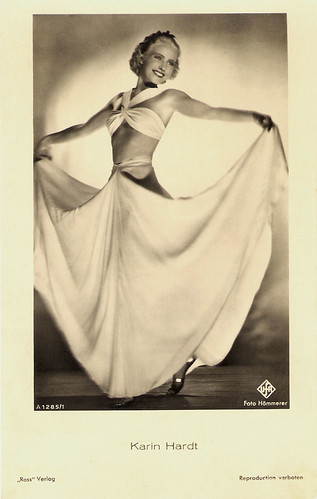
German postcard by Ross Verlag, no. A 1285/1, 1941-1944. Photo: Hämmerer / UFA.
David Bowie
After the war, Karin Hardt was again regularly seen in the cinema. Erich Waschneck directed her in the comedy Danke es geht mir gut/Thanks, I’m alright (1948).
She appeared as the queen in the fairytale film Dornröschen/Sleeping Beauty (Fritz Genschow, 1955), next to Horst Buchholz in Endstation Liebe/Last Stop Love (Georg Tressler, 1957), and with Kirk Douglas in Town Without Pity (Gottfried Reinhardt, 1961).
She mainly appeared in the theatre, in Berlin, Hamburg, Aachen and in Köln (Cologne). From the 1960s on she was also often seen on television, in TV-series like Bei uns zu Haus/At Our Home (1963), Der Forellenhof/The Trout Farm (1965) and Die Unternehmungen des Herrn Hans/The Enterprises of Mr. Hans (Charles Kerremans, 1976).
Hardt also appeared in the film Schöner Gigolo, armer Gigolo/Just a Gigolo (David Hemmings, 1979) with David Bowie. In 1983 she was awarded the Filmband in Gold for her continuing contributions to German cinema.
Then she had a great comeback in the popular serial Die Schwarzwaldklinik/The Black Forest Clinic (1985-1986). She played the housekeeper of the Brinkmann family, the owners of the clinic.
Karin Hardt died of a cerebral haemorrhage in 1992 in Berlin. She was married twice. First to Erich Waschneck from 1933 till his death in 1970, and then to Rolf von Goth.
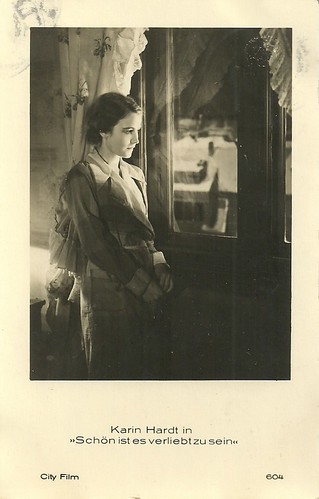
Dutch postcard by City Film, no. 604. Photo: Karin Hardt in the film Schön ist es verliebt zu sein/It's Great to Be in Love (Walter Janssen, 1933-1934).
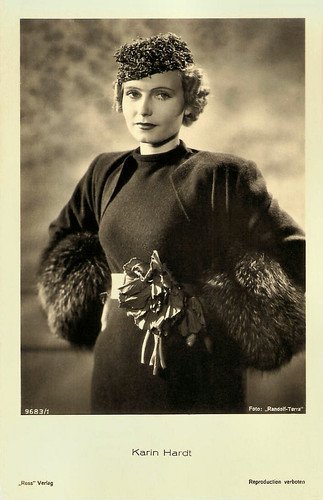
German postcard by Ross Verlag, no. 9683/1, 1935-1936. Photo: Randolf / Terra. Publicity still for Der Abenteurer von Paris/The Paris Adventure (Karl Heinz Martin, 1936).
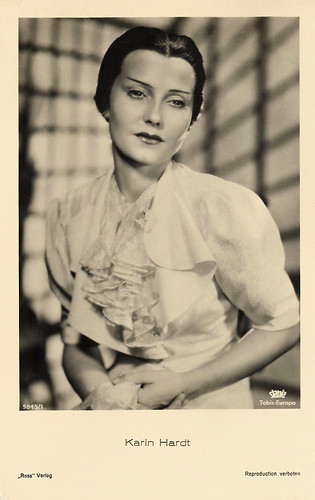
German postcard by Ross Verlag, no. 9945/1, 1935-1936. Photo: Tobis Europa / Slavia. Publicity still for Port Arthur (Nicolas Farkas, 1936).
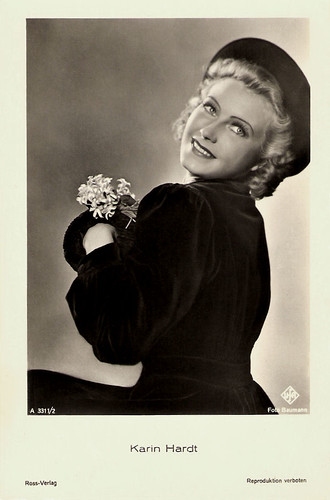
German postcard by Ross Verlag, no. A 3311/2, 1941-1944. Photo: Baumann / UFA.
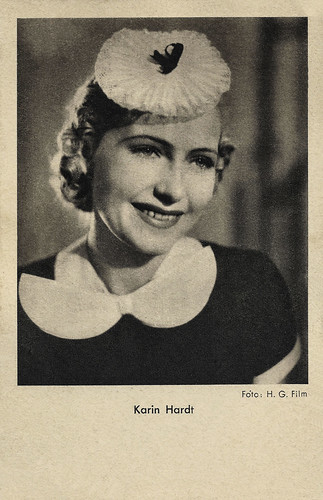
German postcard by Das Programm von Heute / Ross Verlag, Berlin. Photo: H.G. Film.
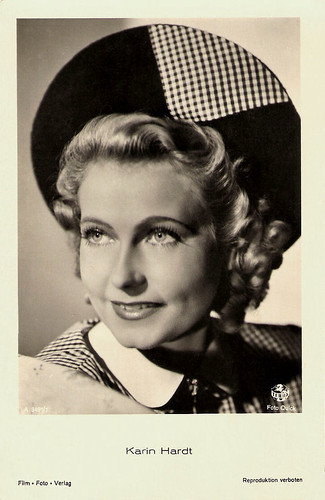
German postcard by Film-Foto-Verlag, no. A 3491/1, 1941-1944. Photo: Quick / Terra.
Sources: Thomas Staedeli (Cyranos), Wikipedia (German), Schwarzwald-TV-Klinik (German), and IMDb.
This post was last updated on 8 August 2024.
No comments:
Post a Comment